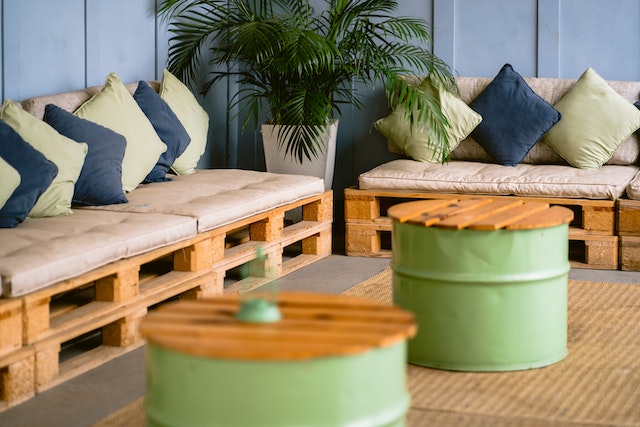
As we strive to live more consciously and reduce our environmental footprint, it’s essential to align our interior design choices with our eco-conscious values. By opting for sustainable furniture, we not only create a serene and harmonious space but also contribute to the well-being of our planet.
In this comprehensive guide, we will explore a curated selection of eco-friendly furniture pieces that blend seamlessly with minimalist aesthetics. From beautiful reclaimed wood dining tables to chic yet sustainable sofas, we have handpicked the finest options that embody both style and sustainability. Join us on this journey as we navigate through exquisite designs that harmonize with nature, without compromising on comfort and functionality.
The Environmental Impact of Furniture
When it comes to creating an eco-friendly home, understanding the environmental impact of furniture is pivotal. Many conventional furniture options use materials and production methods that contribute to deforestation, excessive carbon emissions, and landfill waste. However, by opting for eco-friendly furniture essentials, we can significantly reduce these harmful effects.
Material
One key aspect to consider is the materials used in furniture production. Eco-friendly furniture is crafted from sustainable, renewable, and recycled materials that have a minimal impact on the planet. For instance, reclaimed wood is an excellent option as it gives new life to old timber, reducing the need for fresh logging. Bamboo, another sustainable choice, grows rapidly and is an ideal alternative to traditional hardwoods.
Production Process
The production process of eco-friendly furniture is also a vital consideration. Many eco-conscious brands employ sustainable manufacturing practices such as using non-toxic adhesives, low VOC (volatile organic compound) finishes, and energy-efficient methods. These measures help minimize emissions and hazardous chemicals that can harm both the environment and our health.
Pieces That are Built to Last
Choosing furniture that is built to last is an essential aspect of sustainability. Well-crafted eco-friendly furniture is sturdy and durable, ensuring it won’t end up in the landfill after a few years. Timeless designs and high-quality craftsmanship enable these pieces to withstand the test of time, reducing the need for frequent replacements.

Eco-Friendly Furniture Essentials
Reclaimed Wood Dining Table
Invite nature into your dining room with a beautifully handcrafted reclaimed wood dining table. Each piece tells a unique story, as it is made from salvaged wood sourced from old barns, boats, or buildings. Not only does this add character to your space, but it also helps reduce deforestation and promotes the reuse of materials.
Bamboo Bedframe
Create a tranquil sanctuary in your bedroom with a bamboo bedframe. This sustainable alternative to traditional hardwood frames is as sturdy as it is stylish. Bamboo is known for its rapid growth, making it an eco-friendly choice that doesn’t deplete natural resources.
Recycled Plastic Patio Furniture
Transform your outdoor space into an eco-friendly oasis with patio furniture made from recycled plastic. These durable and weather-resistant pieces are crafted from materials such as plastic bottles and containers. By choosing recycled plastic, you divert waste from landfills and give it new life.
Hemp Upholstered Sofa
Experience sustainable luxury with a hemp-upholstered sofa. Hemp is a versatile and eco-friendly material that requires minimal water and pesticides to grow. It is also a highly durable fabric, ensuring your sofa remains beautiful and comfortable for years to come.
Cork Side Table
Add a touch of natural elegance to your living room with a cork side table. Cork is harvested from the bark of cork oak trees, which naturally regenerates. This renewable material not only has a unique texture but is also lightweight and water-resistant.
Jute Area Rug
Complete the organic feel of your space with a jute area rug. Jute is a sustainable fiber derived from the stems of the jute plant. With its earthy tones and natural texture, a jute rug enhances the minimalist aesthetic while reducing the use of synthetic materials.
Recycled Aluminum Chair
Embrace industrial chic with a recycled aluminum chair. By using recycled aluminum, you contribute to a circular economy, reducing the energy and resources required for new production. These chairs effortlessly blend style, comfort, and sustainability.
Organic Cotton Bedding
Drift off to sleep in comfort and sustainability with organic cotton bedding. Grown without harmful pesticides and fertilizers, organic cotton promotes healthy soil and water conservation. Wrap yourself in luxurious, eco-friendly sheets for a restful night’s sleep.

Recycled Aluminum Chair
Embrace industrial chic with a recycled aluminum chair. By using recycled aluminum, you contribute to a circular economy, reducing the energy and resources required for new production. These chairs effortlessly blend style, comfort, and sustainability.
Organic Cotton Bedding
Drift off to sleep in comfort and sustainability with organic cotton bedding. Grown without harmful pesticides and fertilizers, organic cotton promotes healthy soil and water conservation. Wrap yourself in luxurious, eco-friendly sheets for a restful night’s sleep.
Practical Tips for Selection
When it comes to selecting eco-friendly furniture essentials, there are a few practical tips to keep in mind. By following these guidelines, you can ensure that your choices align with your sustainability goals, while still maintaining a stylish and inviting space.
- Research and Choose Reputable Brands: Before making a purchase, take the time to research eco-conscious furniture brands. Look for certifications such as FSC (Forest Stewardship Council) for wood materials or OEKO-TEX Standard 100 for fabrics, which ensure that the products meet specific environmental and social criteria.
- Opt for Natural or Low-Impact Finishes: Consider furniture pieces that use natural or low-impact finishes instead of conventional paints or varnishes that may release harmful chemicals into the environment. Look for water-based or plant-based finishes that are non-toxic and have low VOC (volatile organic compound) levels.
- Consider Second-hand or Vintage Options: Embrace the timeless charm of second-hand or vintage furniture. Not only will you find unique pieces with character, but you’ll also reduce demand for new production, contributing to a more circular economy.
- Look for Materials with Sustainable Certifications: Materials such as reclaimed wood, bamboo, cork, and recycled plastic are excellent choices for eco-friendly furniture. Look for certifications like the Forest Stewardship Council (FSC) for wood and the Global Organic Textile Standard (GOTS) for fabrics, ensuring that these materials are responsibly sourced and produced.
- Prioritize Durability and Longevity: Opt for well-crafted furniture pieces that prioritize durability and longevity. Quality craftsmanship ensures that your furniture will withstand the test of time, reducing the need for replacements. By choosing durable pieces, you minimize waste and make a long-term investment in sustainable living.
- Consider Multi-purpose Furniture: Make the most of your space and resources by selecting multi-purpose furniture. Choose pieces that serve multiple functions, such as a storage ottoman or a convertible sofa, to maximize both comfort and efficiency.

- Donate or Recycle Old Furniture: When updating your furniture, don’t forget to properly dispose of your old pieces. Consider donating to local charities or organizations that accept furniture donations. If your furniture is beyond repair or reuse, research local recycling programs that can responsibly handle furniture disposal.
By following these practical tips, you can confidently select eco-friendly furniture essentials that not only enhance the aesthetic of your space but also contribute to a more sustainable and earth-conscious lifestyle. Your choices can make a significant impact in creating a greener future for generations to come.
